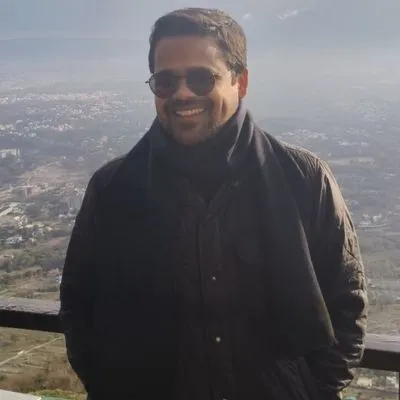Cricket
As Nepal creates ripples at T20 cricket World Cup, a father in Punjab watches

Ram Bahadur Thapa, a peon at the Punjab State Power Corporation Ltd in Patiala, took the day off Saturday and woke up at 4 am to watch the men’s T20 cricket World Cup Group D match between South Africa and Nepal. He wanted to cheer for his son, Sompal Kami, 28, who was batting for Nepal in an important match for the country returning to the T20 World Cup after a gap of 10 years.
One ball left, Nepal needed two runs to win and one to force a Super Over. But then Ghulsan Jha, the striker, was run out while attempting a single, as the throw from the wicketkeeper deflected off his body to a fielder at short mid-on, and Jha also stuttered after the blow.

A disconsolate Kami sank to his knees; back in Patiala, his father was shattered. “Sompal match khatam kar deta agar strike uske pass rehta (He could have finished the match, if he had the strike in the last over),” a dejected Ram Bahadur told The Indian Express.
Kami has a Patiala connection. Thapa, whose family has roots in Gulmi, Lumbini, moved to the district in Punjab for work in 1984, working as a security guard at hotels before landing the PSPCL job. This gave Kami a chance to train at the Netaji Subhas National Institute of Sports there until he was selected to play for his home country.

“From an early age, Kami trained at NIS Patiala but we never realised how good he was. But he got picked for Nepal and within a year he was selected for the 2014 T20 World Cup,” Thapa said.
In a similar India-connection of sorts, Captain Rohit Paudel was in Mumbai when he received the call from his childhood idol Paras Khadka, a legendary former Nepal captain and the secretary of the Nepal Cricket Board, informing him of his selection in the World Cup squad.

So were two other players, Lalit Rajbanshi and Abhinash Bohara. “They were training with me in Mumbai when the team was announced for the T20 World Cup,” said former Nepal coach Umesh Patwal.
‘Climbing Mt Everest’
On Saturday, Nepal’s tryst with history may not have materialised, but with the team’s performance — its spinners Dipendra Singh Airee and Kushal Bhartel restricted South Africa’s power-packed and experienced line-up to just 115 and combined to take seven wickets — former captain Gyanendra Malla can’t be happier. “I am very proud of the way the team is playing. Seeing them playing the World Cup again is one of the proudest moments of my life,” Malla says, adding that he saw the one-run loss against South Africa as a perfect springboard for future achievements.
Nepal has one more match left in the tournament, against Bangladesh on Monday. The team lost an opportunity to bag points when their game against Sri Lanka was abandoned without a ball being bowled due to rain. In the World Cup opener, they had lost to the Netherlands by six wickets. But giving South Africa a mighty scare was the highlight of their campaign.
“We are climbing Mount Everest,” says Malla, “And until now we have only reached the second base camp. The beauty of climbing the world’s biggest peak is that you can’t conquer it in one go and you can’t stay there forever as well. It took us 10 years to get back into the T20 World Cup.”
“The most important thing is to create the foundation for the next generation so that they could conquer the peak again and again,” he adds.
‘A big feat’
Unlike the USA, which is hosting its first major cricket tournament, Nepal’s rise in cricket has been organic: the sport has a huge fan base in the country, the team has native players, instead of the influx of professional cricketers from other countries as seen in some cases. And domestic cricket is widely followed, just like the India of the 1960s and 70s.
Patwal credits this rise to the team’s legendary captain Khadka who, he says, enjoys the same stature in Nepal as M S Dhoni does in India, or maybe “even slightly bigger”. Khadka captained the Nepal cricket team from 2008 to 2019.
“The kids might not know the name of the Prime Minister of Nepal, but they will tell you everything about Paras Khadka,” says Patwal. But over the recent years, it has been a rollercoaster ride for the Nepal national team. Two years after they qualified for their first-ever T20 World Cup in 2014, the International Cricket Council (ICC) suspended the Cricket Association of Nepal citing government interference.
Nepal did eventually emerge from the mess, qualifying for last year’s Asia Cup and now returning to the T20 World Cup. “The fact that Nepal is playing its second World Cup is a big feat… We are playing at the world stage after a gap of 10 years,” says Khadka.
“In 2013, when we played the World Cup qualifier in Dubai, most people didn’t give us any chance. People would hardly believe that we belonged. (In 2014) when we came back from Bangladesh after playing in the T20 World Cup, the love and warmth we received was as if we had won the World Cup! The entire country was on the streets to welcome us,” Khadka says.
Kami and his team can perhaps expect a similar welcome when they return home.
© The Indian Express Pvt Ltd
First uploaded on: 16-06-2024 at 04:00 IST



)






